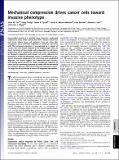Mechanical compression drives cancer cells toward invasive phenotype
Author(s)
Tse, Janet M.; Cheng, Gang; Tyrrell, James A.; Wilcox-Adelman, Sarah A.; Boucher, Yves; Jain, Rakesh K.; Munn, Lance L.; ... Show more Show less
DownloadTse-2012-Mechanical compressi.pdf (1.362Mb)
PUBLISHER_POLICY
Publisher Policy
Article is made available in accordance with the publisher's policy and may be subject to US copyright law. Please refer to the publisher's site for terms of use.
Terms of use
Metadata
Show full item recordAbstract
Uncontrolled growth in a confined space generates mechanical compressive stress within tumors, but little is known about how such stress affects tumor cell behavior. Here we show that compressive stress stimulates migration of mammary carcinoma cells. The enhanced migration is accomplished by a subset of “leader cells” that extend filopodia at the leading edge of the cell sheet. Formation of these leader cells is dependent on cell microorganization and is enhanced by compressive stress. Accompanied by fibronectin deposition and stronger cell–matrix adhesion, the transition to leader-cell phenotype results in stabilization of persistent actomyosin-independent cell extensions and coordinated migration. Our results suggest that compressive stress accumulated during tumor growth can enable coordinated migration of cancer cells by stimulating formation of leader cells and enhancing cell–substrate adhesion. This novel mechanism represents a potential target for the prevention of cancer cell migration and invasion.
Date issued
2012-01Department
Massachusetts Institute of Technology. Department of Chemical EngineeringJournal
Proceedings of the National Academy of Sciences of the United States of America
Publisher
National Academy of Sciences
Citation
Tse, J. M. et al. “From the Cover: Mechanical Compression Drives Cancer Cells Toward Invasive Phenotype.” Proceedings of the National Academy of Sciences 109.3 (2012): 911–916. Copyright ©2012 by the National Academy of Sciences
Version: Final published version
ISSN
0027-8424
1091-6490